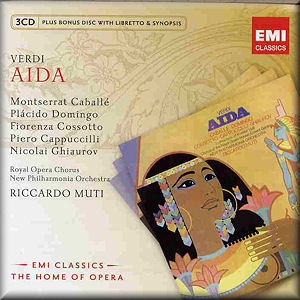 |
 |
|


alternatively
CD:
MDT
AmazonUK
AmazonUS
|
Giuseppe VERDI (1813-1901)
Aida - opera in four acts (1871)
 Il Re, King of Egypt – Luigi Roni (bass)
Il Re, King of Egypt – Luigi Roni (bass)
Amneris, his daughter - Fiorenza Cossotto (mezzo)
Radames, captain of the guards - Placido Domingo (tenor)
Amonasro, King of Ethiopia - Piero Cappuccilli (baritone)
Aida, his daughter - Montserrat Caballé (soprano)
Ramfis, High priest – Nicolai Ghiaurov (bass)
Royal Opera Chorus
New Philharmonia Orchestra/Riccardo Muti
rec. Walthamstow Assembly Hall, London, July 1974.
 EMI CLASSICS 5406302 [3 CDs: 39.42 + 41.14 + 65.25 + bonus disc]
EMI CLASSICS 5406302 [3 CDs: 39.42 + 41.14 + 65.25 + bonus disc] 
|
|
|
Riccardo Muti was very much the new kid on the block when he
took over as the chief conductor of London’s New Philharmonia
Orchestra in 1972. Already recognised as an outstanding trainer
of orchestras and opera conductor much was expected of him.
The major record label EMI, never, at that time, one to miss
out, signed him and launched a series of Verdi opera recordings
with this Aida. It came complete with a cast that could
scarcely have been bettered at the time. The company had recorded
the work a number of times in the post Second World War period
starting with Maria Caniglia and Beniamino Gigli as Aida and
Radames in 1946 (see review).
They followed with Callas and Richard Tucker in 1955 (see review)
and Nilsson and Corelli in a less than successful venture twelve
years later. They followed this present 1974 recording with
yet another under Karajan in May 1979. Based on a Salzburg production
and with the casting of Mirella Freni and José Carreras, rather
smaller voices than usual, in the lead roles (see review).
Those were indeed days of plenty.
The early 1970s celebrated the first performance of Aida
in Cairo in 1871. The opera had been commissioned by the Khedive
of Egypt to celebrate the opening of the Suez Canal in 1869.
However, negotiations with Verdi, and then the siege of Paris
stopping the scenery getting to Egypt, delayed the premiere
until 1871. In preparation for the centenary celebrations, RCA
recorded a magnificent cast including the young Placido Domingo
alongside Leontyne Price in London in July 1970; it was eagerly
awaited. In the event the recording itself was very variable
in quality with dropouts among other problems. This present
recording was equally eagerly awaited in turn, particularly
following the disappointments of the RCA. As my memory serves
me, there were experiments going on with surround-sound possibilities
and there were some who thought this Aida recording when
issued on LP was influenced, and not for better, by those experiments.
Be that as it may, the original CD issue showed no sonic limitations.
It did, however, and does so here, highlight some vocal shortcomings,
particularly Piero Cappuccilli’s rather bland interpretation
of Amonasro. This is best illustrated during Amonasro’s meeting
with his daughter by the Nile in act three (CD 3 Trs 5-7 and
12) where his reaction to Aida is pallid compared to that of
Gobbi with Callas in 1955. Elsewhere Muti’s rigid tempi often
rush his singers; it is as if he was trying to outdo Toscanini.
Cappuccilli’s lack of interest can be off-set by Montserrat
Caballé’s wonderfully elegiac singing of the name part. Recorded
at the height of her bel canto success, her singing of
Ritorna vincitor! (CD 1 Tr 9) and O patra mia
(CD 3 Tr.4) are noteworthy. Fiorenza Cossotto is a dramatic
and idiomatic Amneris and Nicolai Ghiaurov a rock-solid Ramfis.
With Domingo contributing one of the most lyric of his several
recordings of Radames, this quartet cut the mustard. Muti’s
rigidity on the rostrum affects much of the balance in the opera
between the grandiose and the more intimate personal relationships
and with it the real soul of the work as Verdi conceived it.
This performance was re-mastered for its reissue in 2001 as
an EMI Great Recording of the Century (see review)
when it came complete with libretto. In this latest manifestation
the libretto in English, French and German, and an essay by
Richard Osborne for the 2001 re-issue, is contained on the bonus
CD-ROM.
Verdi stipulated a fee of 150,000 Francs, payable at the Rothschild
Bank in Paris on delivery of Aida. This was four times
what he was paid for Don Carlos, premiered at the Paris
Opéra in 1867 to celebrate the International Exhibition staged
in the city that year, making him the highest paid composer
ever. The music he created matched the grand concept of the
Canal with which it has become associated, whilst the opera
has become one of the most popular operas in the repertoire.
Robert J Farr
|
|












